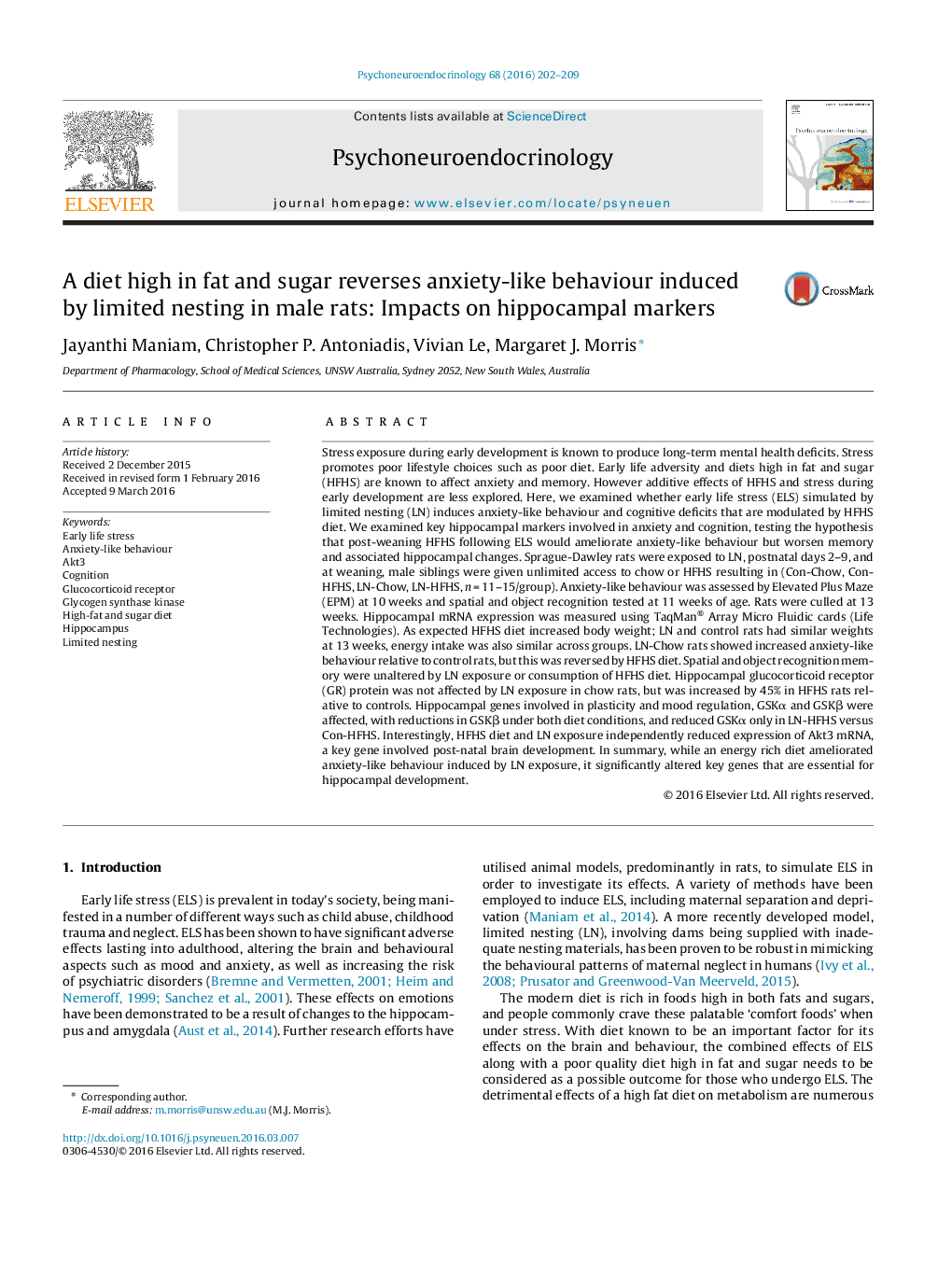| کد مقاله | کد نشریه | سال انتشار | مقاله انگلیسی | نسخه تمام متن |
|---|---|---|---|---|
| 6818222 | 547107 | 2016 | 8 صفحه PDF | دانلود رایگان |
عنوان انگلیسی مقاله ISI
A diet high in fat and sugar reverses anxiety-like behaviour induced by limited nesting in male rats: Impacts on hippocampal markers
ترجمه فارسی عنوان
یک رژیم غذایی با چربی و قند باعث تغییر رفتار اضطرابی ناشی از محدودیت لانه در موشهای نر می شود: تاثیر بر روی نشانگرهای هیپوکمپ
دانلود مقاله + سفارش ترجمه
دانلود مقاله ISI انگلیسی
رایگان برای ایرانیان
کلمات کلیدی
موضوعات مرتبط
علوم زیستی و بیوفناوری
بیوشیمی، ژنتیک و زیست شناسی مولکولی
علوم غدد
چکیده انگلیسی
Stress exposure during early development is known to produce long-term mental health deficits. Stress promotes poor lifestyle choices such as poor diet. Early life adversity and diets high in fat and sugar (HFHS) are known to affect anxiety and memory. However additive effects of HFHS and stress during early development are less explored. Here, we examined whether early life stress (ELS) simulated by limited nesting (LN) induces anxiety-like behaviour and cognitive deficits that are modulated by HFHS diet. We examined key hippocampal markers involved in anxiety and cognition, testing the hypothesis that post-weaning HFHS following ELS would ameliorate anxiety-like behaviour but worsen memory and associated hippocampal changes. Sprague-Dawley rats were exposed to LN, postnatal days 2-9, and at weaning, male siblings were given unlimited access to chow or HFHS resulting in (Con-Chow, Con-HFHS, LN-Chow, LN-HFHS, n = 11-15/group). Anxiety-like behaviour was assessed by Elevated Plus Maze (EPM) at 10 weeks and spatial and object recognition tested at 11 weeks of age. Rats were culled at 13 weeks. Hippocampal mRNA expression was measured using TaqMan® Array Micro Fluidic cards (Life Technologies). As expected HFHS diet increased body weight; LN and control rats had similar weights at 13 weeks, energy intake was also similar across groups. LN-Chow rats showed increased anxiety-like behaviour relative to control rats, but this was reversed by HFHS diet. Spatial and object recognition memory were unaltered by LN exposure or consumption of HFHS diet. Hippocampal glucocorticoid receptor (GR) protein was not affected by LN exposure in chow rats, but was increased by 45% in HFHS rats relative to controls. Hippocampal genes involved in plasticity and mood regulation, GSKα and GSKβ were affected, with reductions in GSKβ under both diet conditions, and reduced GSKα only in LN-HFHS versus Con-HFHS. Interestingly, HFHS diet and LN exposure independently reduced expression of Akt3 mRNA, a key gene involved post-natal brain development. In summary, while an energy rich diet ameliorated anxiety-like behaviour induced by LN exposure, it significantly altered key genes that are essential for hippocampal development.
ناشر
Database: Elsevier - ScienceDirect (ساینس دایرکت)
Journal: Psychoneuroendocrinology - Volume 68, June 2016, Pages 202-209
Journal: Psychoneuroendocrinology - Volume 68, June 2016, Pages 202-209
نویسندگان
Jayanthi Maniam, Christopher P. Antoniadis, Vivian Le, Margaret J. Morris,
